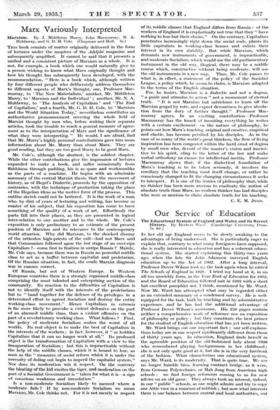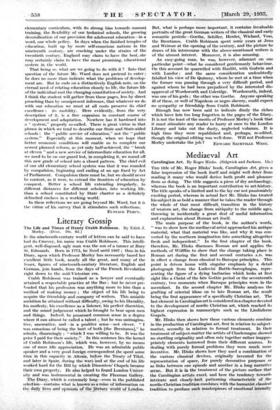Our Service of Education
IN her old age England seems to be slowly awaking to the advantages of being understood. She is particularly eager to explain that, contrary to what many foreigners have supposed, she is really interested in education and has a coherent educa- tional system. She started explaining this thirty-two years ago, when the late Sir John Adamson surveyed English education up to the Act of 1902. After a long interval, Professor Dover Wilson took up the task again when he edited The Schools of England in 1928. I tried my hand at it, in an all too unwieldy form, in the Year Book of Education for 1932, and the Board of Education followed suit in 1933 with a short but excellent pamphlet not, I think, mentioned by Mr. Ward. Now Mr. Ward has attempted what may be regarded either as an extended summary or a condensed survey. He is well- equipped for the task, both by teaching and by administrative experience, and he has had the additional advantage of Professor Dover Wilson's assistance. His 250 pages contain neither a comprehensive work of reference nor an exposition of philosophy or policy ; but they constitute the best primer for the student of English education that has yet been written.
Mr. Ward brings out one important fact ; our self-explana- tions today are in one respect significantly different from those of thirty years ago. In education, England finds herself in the agreeable position of the old-fashioned lady about 1930 who remembered playing backgaMmon in her childhood ; she is not only quite good at it, but she is in the very forefront of the fashion. What characterizes our educational system, says Mr. Ward, is its modernity. That is quite true. We are no longer humble tiros, learning contract bridge, as it were, from German Polytechnics, or Mall Jong from American high schools ; we find foreign reformers coming to us for new advice on an old game. They always-took an interest, indeed, in our " Public " schools, as one might admire and try to copy one Attic vase in a museum of rubbish ; but now what interests, them is our balance between central,and local authorities, our
elementary curriculum, with its strong- bias towards manual training, the flexibility of our technical schools, the growing diversification of our provision for adolescent education—in a word, our whole policy. In days when the finished temples of education, built up by more self-conscious nations in the nineteenth century, are cracking under the strains of the twentieth century, England may claim to have the best, she may certainly claim to have the most promising, educational system in the world.
That being so. what are we going to do with it ? Into that question of the future Mr. Ward does not pretend to enter ; he does no more than indicate what the problems of develop- ment are. But he ends on a distinctively English note, on the eternal need of relating education closely to life, the future life of the individual and the changing constitution of society. And I think the student will gather from these pages, less by direct preaching than by omnipresent inference, that whatever we do with our education we must at all costs preserve its chief excellence : its mobility. Here evidently, from the very description of it, is a free organism in constant course of development and adaptation. Nowhere has it hardened into a " system," properly so-called. There is great virtue in that phrase in which we tend to describe our State and State-aided schools : the " public service of education," not the " public system." Especially at this moment, when we hope that better economic conditions will enable us to complete our newest planned reform, as yet only half-achieved, the " break at eleven " and a new service of intermediate education for all, we need to be on our guard lest, in completing it, we round off this new grade of school into a closed pattern. The chief evil of our old elementary school system was that it was rounded by compulsion, beginning and ending at an age fixed by Act of Parliament. Compulsion there must be, but we should never be content, as it were, to extend the frontiers of education by conquest. Better a school life extending irregularly, to different distances for different scholars, into working life, than a school constituted by State charter as a definitely delimited enclave in a working world.
In these reflections we are going beyond Mr. Ward, but it is the virtue of his survey that it stimulates such reflections.
EUSTACE PERCY.







































 Previous page
Previous page